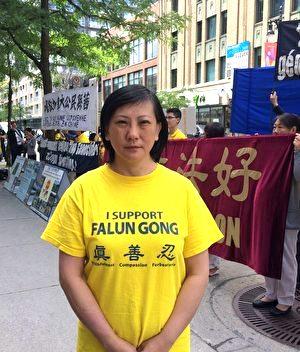Kidnapped, interrogated, threatened, and mentally abused is how Chinese-Canadian Ying Zhu describes her treatment at the hands of the authorities after she arrived in China from Montreal to visit her parents in May 2001. Her mother had undergone two heart surgeries and Zhu very much wanted to see her.
It was Zhu’s first visit to China since immigrating to Canada in 1997; at the time she was a permanent resident. But upon her arrival at a train station in Guangzhou City she was immediately detained and grilled by people from the Ministry of National Security. She was then taken to another location and interrogated and pressured for more than 30 days.
“I was not allowed to step out of the door for the entire 33 days. I was not allowed to contact anybody or make a phone call. I was totally isolated from the outside world,” said Zhu, an adherent of Falun Dafa, a meditation practice also called Falun Gong.
Meanwhile, her parents had been expecting her and had no idea where she was. The local authorities told them they didn’t know.
Zhu was monitored by 12 people, both male and female, around the clock in shifts of three at a time—even when she slept and used the toilet; the bathroom had no door.
“I could not sleep with three people watching me and with the 120-watt light bulb on 24 hours a day. They never turned it off,” she said.
“Every one of my movements, temperaments, expressions, and emotions were recorded and filed. I felt very tense and nervous. Using the washroom was humiliating and difficult as they were in the room. My health began to deteriorate and my internal system became chaotic. I knew they were trying to break me.”
Every day, three people other than those monitoring her came to interrogate her. They not only tried to persuade her to give up practicing Falun Dafa, but they also asked detailed questions about every person in her address book.
Coercing adherents to quit Falun Dafa is a key part of the Chinese Communist Party’s campaign of persecution against the practice, launched by then-Party leader Jiang Zemin in 1999.

Veiled Threat from ‘Psychology Professor’
Zhu also received two visits by a man claiming to be a “psychology professor” who told her he had forced many Falun Gong prisoners of conscience to quit practicing. He said many were sent to mental hospitals to receive “psychiatric treatment.” He also told her that it was easy in China to create false allegations and accusations, noting that a famous marshal in the People’s Liberation Army had been framed and sent to prison, where he died.“I started to worry that they would send me to a mental hospital, because I had no intention of giving up Falun Dafa,” she said.
“I knew he was trying to intimidate me, but I was still frightened. I knew clearly what he said was a reality in China. Many innocent people have been falsely accused and severely persecuted due to various reasons in the past 50 years of communist rule. I worried that if I died here, no one would ever know how I disappeared or what had happened to me.”
Thanks to a strong, concerted rescue campaign back in Canada—which was even mentioned to Zhu by one of the guards—she was finally released after 33 days, but was then kept under surveillance at her parents’ home.
Before returning to Canada, Zhu was asked to promise in writing not to engage in activities in Canada that go against Chinese government and promise to report any related activity to government officials, but she refused. She was also threatened that her life and studies in Canada could be in danger if she spoke about what happened when she was detained.
- Psychological Torture: Worst Scars Are in the Mind
- Psychiatric Torture and the Unspeakable Suffering It Causes
- Healing Betrayed: The Perversion of Psychiatry in China
- Forced Organ Harvesting: Blowing the Whistle on a Brutal Crime
- Former Medical Intern Recounts Witnessing Live Organ Harvesting by China’s Military
- Doctor Reveals Details of Forced Organ Harvesting in Military Concentration Camps
- Eyewitness Recounts Forced Organ Removal in China
- An Unprecedented Crime: State-Directed Mass Killing of Prisoners of Conscience in China for Their Organs
- Forced Organ Harvesting: Overseas Patients Flocking to China for Transplants
- Chinese Doctors Admit to Forced Organ Harvesting of Falun Dafa Adherents in Phone Calls
- Over 100 Torture Methods Used in China’s Prison System
- Horrors of Chinese Torture Methods
- Tortured in China: Two Canadians Who Lived to Tell the Tale
- Sexual Torture of Detained Falun Dafa Adherents Rampant: Rights Lawyer
- Sexual Torture in Chinese Prisons: ‘No Limits to the Perversion’
- 4 Cases of Sexual Torture of Falun Dafa Adherents Documented by Gao Zhisheng
- Whistleblower: Ex-husband Forcibly Removed Corneas From 2,000 Living Prisoners





